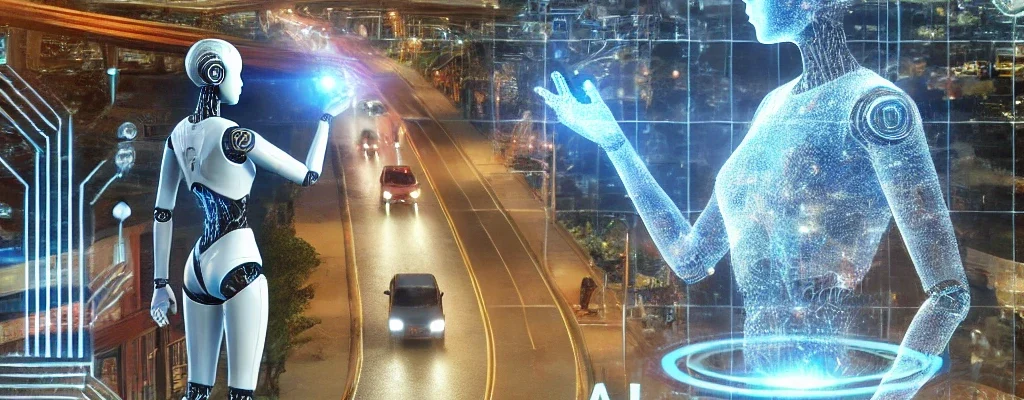The Rise of Artificial Intelligence: Transforming the Present and Shaping the Future
Artificial Intelligence (AI) has rapidly moved from the realm of science fiction to a cornerstone of modern technology, profoundly influencing nearly every sector of society. From enhancing everyday conveniences to driving industrial innovation, AI is transforming the way we live, work, and interact with the world around us.
What is AI?
At its core, AI refers to the simulation of human intelligence processes by machines, particularly computer systems. These processes include learning (the acquisition of information and rules for using the information), reasoning (using rules to reach approximate or definite conclusions), and self-correction. The concept encompasses various subfields such as machine learning, natural language processing, robotics, and computer vision.
Historical Context
The idea of intelligent machines dates back to ancient myths, but the formal field of AI was established in 1956 during a conference at Dartmouth College. Early AI research in the 1960s and 1970s focused on problem-solving and symbolic methods. However, the limitations of early computers meant progress was slow, leading to periods of optimism followed by “AI winters,” where interest and funding for AI research dwindled.
The resurgence of AI began in the 1990s and 2000s, driven by advancements in algorithms, increased computational power, and the explosion of data. The advent of machine learning, particularly deep learning, marked a turning point, enabling machines to recognize patterns and make decisions with unprecedented accuracy.
AI in Everyday Life
AI has seamlessly integrated into daily life, often in ways that go unnoticed. Voice-activated assistants like Siri, Alexa, and Google Assistant use natural language processing to understand and respond to user queries. Recommendation algorithms on platforms like Netflix, YouTube, and Amazon analyze user behavior to suggest content or products, tailoring experiences to individual preferences.
In healthcare, AI-driven diagnostics and predictive analytics are revolutionizing patient care. AI algorithms can analyze medical images with remarkable precision, sometimes even outperforming human experts. Personalized medicine, where treatments are tailored to individual genetic profiles, is becoming a reality thanks to AI’s ability to process vast amounts of genetic data.
Transportation is another sector experiencing an AI-driven transformation. Autonomous vehicles, once a futuristic dream, are now being tested on roads around the world. AI systems in these vehicles analyze real-time data from sensors and cameras to make split-second decisions, aiming to reduce accidents and improve traffic flow.
AI in Industry and Business
Businesses are increasingly adopting AI to enhance productivity, improve decision-making, and gain competitive advantages. In manufacturing, AI-powered robots and automation systems streamline production processes, reduce errors, and lower costs. Predictive maintenance, powered by AI, helps companies anticipate equipment failures before they occur, minimizing downtime and extending the lifespan of machinery.
In finance, AI algorithms are used for high-frequency trading, risk assessment, fraud detection, and personalized banking services. AI’s ability to analyze market trends and financial data at lightning speed is reshaping the way financial institutions operate, offering new levels of efficiency and security.
Ethical Considerations and Challenges
As AI continues to evolve, it raises significant ethical questions and challenges. One of the most pressing concerns is job displacement. While AI can enhance productivity, it also threatens to automate roles traditionally performed by humans, particularly in manufacturing, retail, and customer service. This shift could lead to widespread job loss and exacerbate economic inequality.
Moreover, AI systems are only as good as the data they are trained on. If this data contains biases—whether based on race, gender, or socioeconomic status—AI can inadvertently perpetuate these biases, leading to unfair outcomes. Ensuring AI systems are transparent, accountable, and free from bias is an ongoing challenge for developers and policymakers.
The potential misuse of AI is another concern. In the wrong hands, AI could be used for malicious purposes, such as creating deepfakes, conducting cyberattacks, or enhancing surveillance capabilities in ways that infringe on privacy and civil liberties. As AI becomes more powerful, the need for robust regulatory frameworks and ethical guidelines becomes increasingly urgent.
The Future of AI
Looking ahead, the future of AI is both exciting and uncertain. Continued advancements in AI could lead to breakthroughs in areas like healthcare, climate change, and space exploration. However, these advancements also necessitate careful consideration of the social, ethical, and economic implications.
One of the most anticipated developments is the creation of artificial general intelligence (AGI)—a machine capable of performing any intellectual task a human can do. While current AI systems are specialized and excel at specific tasks, AGI would represent a leap toward machines with human-like cognitive abilities. The timeline for achieving AGI is uncertain, with estimates ranging from decades to centuries.
In the short term, AI will continue to enhance our capabilities, providing tools to solve complex problems and unlocking new possibilities. The key to harnessing AI’s potential lies in balancing innovation with responsibility, ensuring that this powerful technology benefits all of humanity.
Conclusion
Artificial Intelligence is no longer a distant concept; it is a driving force shaping our present and future. As AI continues to advance, it offers unprecedented opportunities for innovation, efficiency, and growth. However, these opportunities come with challenges that must be addressed through thoughtful regulation, ethical considerations, and a commitment to ensuring that AI serves the greater good. The journey of AI is just beginning, and its impact will be felt across every facet of society in the years to come.


